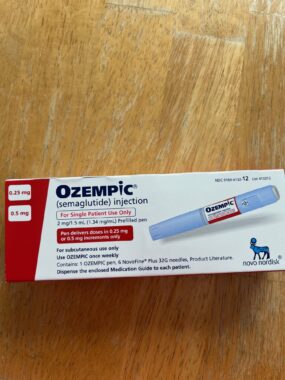Using Ozempic in hopes of qualifying for a lung transplant
Columnist Ann Reynoso explains how she hopes the medication will benefit her
Written by |

My health journey began with a rare illness called lymphocytic interstitial pneumonia (LIP). Coping with the diagnosis was hard, but I knew I could do it. What I didn’t expect was that I’d have to handle several other conditions on top of it.
I’ve also been diagnosed with pulmonary fibrosis (PF), atrial fibrillation, rheumatoid arthritis, and more recently, prediabetes, thanks to a hemoglobin A1C test.
According to MedlinePlus, “A hemoglobin A1C (HbA1C) test is a blood test that shows what your average blood sugar (glucose) level was over the past two to three months.” A result of 6.5% or higher indicates diabetes, while 5.7-6.4% indicates prediabetes. Over the past year, my A1C levels have remained between 6% and 6.4%.
Type 2 diabetes, heart disease, and obesity are genetic on both sides of my family. I’ve struggled with morbid obesity for most of my life, but when I was diagnosed with LIP, I started taking my health more seriously. I’ve tried so hard to lose weight with diets, exercise, and intermittent fasting, but nothing has helped. My high A1C levels have been hard to keep under control.
I mentioned to my primary care practitioner (PCP) that my pulmonologist and I had discussed the possibility of me being placed on the double-lung transplant list. To qualify, however, my body mass index (BMI) needs to be below 35, and it’s currently 46.91. Studies have shown that outcomes are better when transplant recipients are at an ideal body weight.
My pulmonologist advised me to continue with the weight loss so that I can move forward with the transplant evaluation process. Considering my other health concerns, my PCP and I discussed the use of Ozempic (semaglutide) to help control my A1C levels, heart disease, and morbid obesity.

My once-weekly Ozempic injection. (Photo by Ann Reynoso)
What is Ozempic?
Ozempic is a once-weekly injection that can range from 0.25 mg to 2 mg and must be prescribed by a physician. It’s primarily used to lower blood sugar in adults with type 2 diabetes, along with diet and exercise, and can reduce the risk of major cardiovascular events, such as stroke, heart attack, or death. Common side effects may include nausea, vomiting, diarrhea, abdominal pain, and constipation.
It’s always best to consult your physician before taking this medication.
Controversy of Ozempic
I was excited to get a prescription to treat my prediabetes, but little did I know the controversy behind this medication.
Ozempic is used to treat type 2 diabetes, but with the side effect of rapid weight loss, it’s become one of the most popular weight-loss trends among Hollywood celebrities.
A number of news outlets have reported that Hollywood has become so obsessed with the medication’s weight-loss “magic” that physicians, pharmacies, and diabetic patients are now seeing a shortage of Ozempic. The shortage could also be blamed on the drug’s cost. Most independent pharmacies are given lower reimbursement rates than larger retail pharmacy chains, as NBC News reported, and some have since refused to carry it.
The thought of a diabetic patient not being able to obtain this medication causes me grave concern. When I heard about the shortage, I began to feel guilty that I was prescribed this medication for prediabetes. I worried that I would take it away from a person who desperately needs it to stay healthy.
I discussed my concerns with my doctor, and she assured me that my body was not creating enough insulin to keep my prediabetes under control. She said that Ozempic would provide important help on my weight-loss journey, both in terms of lowering my HbA1C levels and helping me qualify for a double-lung transplant.
Hopes of survival
I don’t want my experience with Ozempic to be all about weight loss. The actual purpose of this medication is to control my prediabetes, and I’m hopeful that it’ll decrease my chances of developing type 2 diabetes. My weight loss is a part of my story, but it’s not the whole story.
Ozempic is also giving me the chance to become a double-lung transplant recipient, which could prolong my life with a rare disease that has no cure.
Note: Pulmonary Fibrosis News is strictly a news and information website about the disease. It does not provide medical advice, diagnosis, or treatment. This content is not intended to be a substitute for professional medical advice, diagnosis, or treatment. Always seek the advice of your physician or other qualified health provider with any questions you may have regarding a medical condition. Never disregard professional medical advice or delay in seeking it because of something you have read on this website. The opinions expressed in this column are not those of Pulmonary Fibrosis News or its parent company, Bionews, and are intended to spark discussion about issues pertaining to pulmonary fibrosis.







David Ota
Hi Ann
I just read your Ozempic post. Your post triggered a memory of a story my wife told me. During a lung transplant work up, an IPF patient was told she should lose weight to become listed. She lost the weight, but by diet alone. When she returned to the transplant team, she was told she was not a good transplant candidate because she was so weak she could not stand. Ozempic is a "new" weight loss drug. You may want to asked the transplant team their recommendation before starting treatment. I have seen 1st hand transplant criteria is not just Age + BMI - Comorbidities. The process seems to cover alot of ground.
Mary Beth Adomaiitis
Hi. Just ran across this. I could have written this! .I have PF because of an autoimmune disease. I just finished my dbl lung transplant evaluation. My PCP put me on Ozempic in June 2022. I had a BMI of 45-46. It is now 32 and I need to get below 30 to be listed. I was prediabetic, and had all the typical issues that come with being morbidly obese. My PFTs have improved and A1C, cholesterol are now normal. I am thankful for this medicine. I know I wouldn’t have been able to lose the weight and get healthier without it. How is your process going?
Mary OConnell
Mine wasn’t great but I did pulmonary rehab 5 days a week I was strong and being strong helped me get thru not one but 2 lung transplants and mine was 34 I believe. Being strong is the #1 issue I was 58 and 61 when I did mine. Exercise is #1 you have to be strong